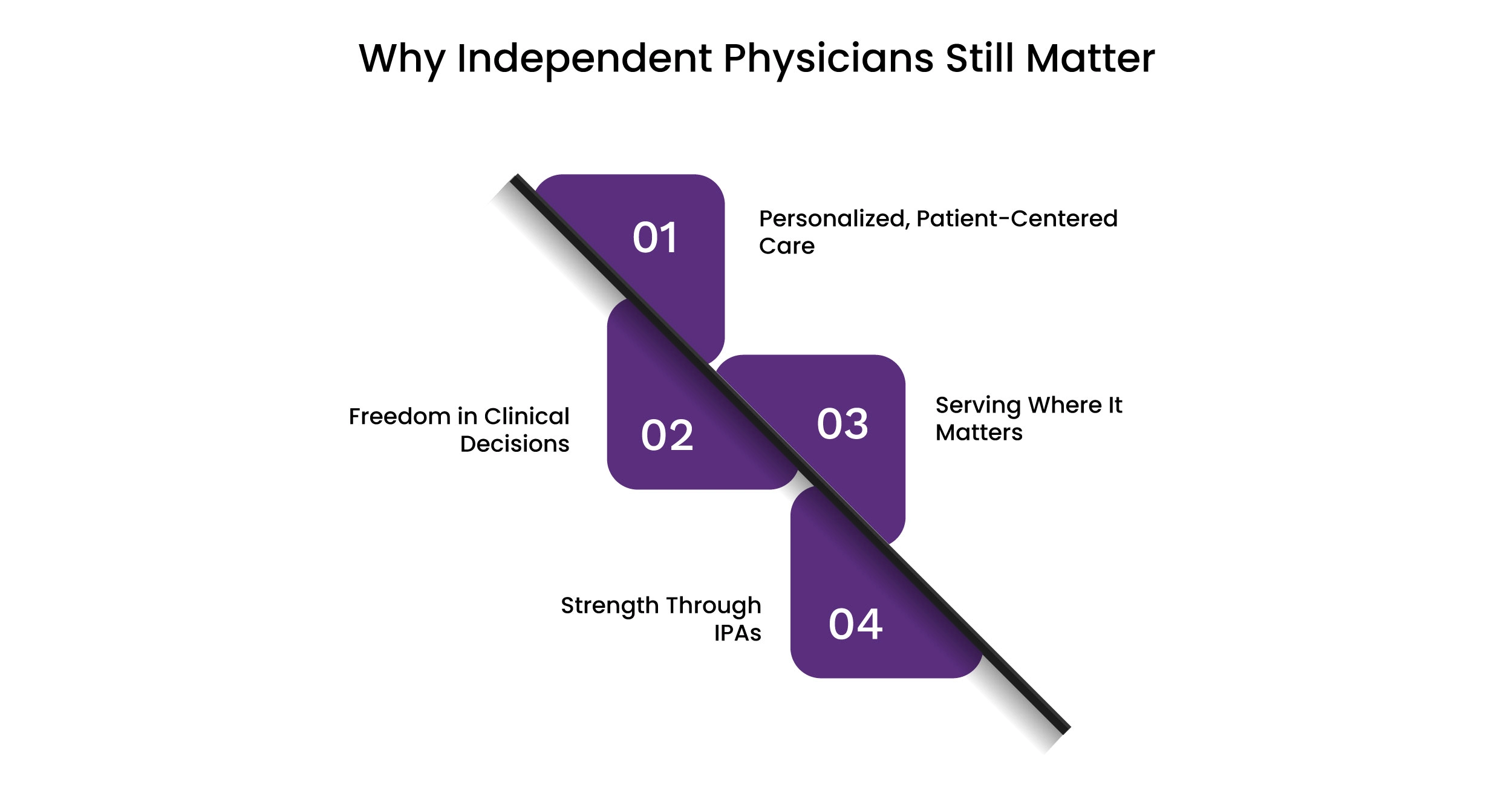Independent Physician Associations (IPAs) offer a compelling alternative to healthcare consolidation. Often misunderstood, IPAs empower doctors to remain independent while benefiting from collective bargaining, streamlined billing, and shared resources. Far from just administrative entities, they protect clinical autonomy and enhance operational efficiency. This article explores what an IPA is and why it matters in today’s shifting healthcare environment.
What is an IPA in Healthcare?
An IPA (Independent Physician Association) is a network of independent physicians who collaborate to negotiate contracts, share administrative resources, and enhance patient care without sacrificing autonomy.
From cost-control initiatives in the 1970s to modern value-based care champions, IPAs have evolved with the ever-changing dynamics of the healthcare ecosystem.
Understand the legal and operational anatomy of IPAs, including their contract models with payers (e.g., FFS, capitation).
What is IPA in Medical Billing?
In medical billing, an IPA plays a crucial role by centralizing billing compliance, contract negotiation, and payer coordination — simplifying revenue cycle management for independent providers.
IPA’s Role in RCM: More Than a Middleman
In the world of medical billing, Independent Physician Associations (IPAs) play a much deeper role than many assume. They’re not just administrative middlemen—they function as strategic facilitators who help independent providers navigate complex payer landscapes, manage claims more efficiently, and negotiate favorable reimbursement contracts.
IPAs act as a centralized hub, often handling critical aspects of the revenue cycle so individual physicians can focus on care rather than compliance. In an era where insurance rules shift frequently and denied claims can sink a practice, having IPA support is less a luxury and more a necessity.
Here’s how IPAs function within medical billing:
-
Centralized Claims Management: Reduces redundancy and minimizes errors in coding and submission.
-
Contract Negotiation Support: Ensures providers receive more competitive reimbursement rates.
-
Credentialing & Payer Enrollment: Handles time-consuming processes with greater efficiency.
-
Regulatory Compliance: Keeps providers aligned with HIPAA, MACRA, and other evolving standards.
-
Performance Tracking: Uses analytics to monitor KPIs and improve billing outcomes.
Rather than eliminating independence, IPAs preserve it—while strengthening financial sustainability through smarter billing practices.
Practical Tip.
Before joining an IPA, review its governance model and provider agreement closely. Ask how much autonomy you retain in clinical decision-making and billing operations—it varies widely between IPAs.
IPA vs Medical Group: The Real Difference No One Talks About
Control vs Centralization
IPAs and medical groups may look similar, but their core structures are fundamentally different. IPAs allow physicians to remain independent while sharing resources and negotiating collectively. Medical groups, on the other hand, operate under centralized governance where key decisions—clinical, financial, operational—are made by leadership rather than individual providers. This affects everything from patient care protocols to billing workflows.
Flexible vs Fixed Compensation
In an IPA, providers can choose reimbursement models that suit their practice style—fee-for-service, capitation, or hybrid models. Medical groups typically impose standardized compensation structures, which can limit earnings potential and performance-based incentives for high-performing physicians.
Agility vs Bureaucracy
Independent physicians within IPAs can quickly respond to regulatory changes, adopt new technologies, and implement care innovations. In contrast, medical groups often experience slow decision-making due to layers of administration and top-down policies.
Why Independent Physicians Still Matter

-
Personalized, Patient-Centered Care
Independent physicians offer greater flexibility and continuity, allowing for stronger, long-term patient relationships that are often lost in larger health systems. -
Freedom in Clinical Decisions
They make medical decisions based solely on patient needs, free from the influence of corporate policies or productivity quotas. -
Serving Where It Matters
Many independent providers work in underserved or rural areas, addressing critical gaps in healthcare access. -
Strength Through IPAs
By joining IPAs, they preserve their autonomy while gaining access to shared resources, better payer contracts, and operational support—without sacrificing independence.
Practical Tip.
Leverage your independence as a marketing advantage. Highlight continuity of care, flexible scheduling, and personalized treatment in your patient communications—values patients often associate with smaller practices.
Who Are Independent Physicians? Why Their Role is More Critical Than Ever
Independent physicians are not just resisting consolidation — they’re redefining healthcare on their terms.
Personalized Care vs Protocolized Care
The independent model often results in deeper patient relationships and better chronic care management.
The Silent Backbone of U.S. Healthcare
Despite limited resources, independent physicians deliver high-touch, high-value care — often more efficiently than hospital-employed counterparts.
The Role of IPAs in Insurance and Payer Relationships
Strength in Numbers for Better Contract Negotiation
IPAs unite independent physicians into a single network, giving them collective bargaining power to negotiate more favorable insurance contracts—something most solo providers cannot achieve alone.
Simplifying Credentialing and Compliance
IPAs manage time-consuming processes like payer credentialing, contract renewals, and compliance with insurance protocols, helping providers avoid administrative backlogs and payment delays.
Adapting to Value-Based Care Demands
As insurance companies shift toward value-based models, IPAs support physicians with performance tracking, quality reporting, and data submission—making it easier to meet evolving payer requirements without sacrificing clinical time.
How HMS USA LLC Helps IPA Providers Relieving the Administrative Load
IPA providers often face overwhelming demands in billing, credentialing, and compliance, which can divert focus from patient care. HMS USA LLC steps in to ease this burden by streamlining back-office tasks, helping providers avoid costly delays and administrative fatigue.
Tailored RCM and Workflow Integration
HMS delivers solutions that align with each IPA's existing processes, not disrupt them. From denial management to payer credentialing, every service is customized to fit the provider’s structure—supporting autonomy while strengthening overall system efficiency.
Building Sustainable Practice Infrastructure
With centralized reporting, real-time analytics, and scalable billing systems, HMS equips IPAs with the tools to improve cash flow and reduce risk. The aim is to enhance—not replace—internal teams, allowing providers to stay competitive while remaining independent.
ABOUT AUTHOR

John Wick
As a blog writer with years of experience in the healthcare industry, I have got what it takes to write well-researched content that adds value for the audience. I am a curious individual by nature, driven by passion and I translate that into my writings. I aspire to be among the leading content writers in the world.
